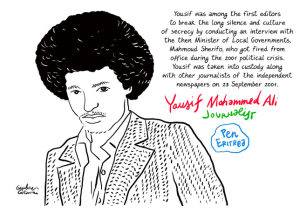In the wake of the tragic failure of Eritrea’s 1998-2000 border war with Ethiopia, senior members of the Eritrean government began a campaign to bring about the democracy that the 30 year war of liberation had been fought for.
They formed the G-15: men and women who challenged President Isaias to give the Eritrean people the freedoms they had been promised. In dawn raids on 18 and 19 September 2001 the president’s notorious security forces rounded them up and jailed them. None have ever been taken before a court or convicted of any crime. They have rotted in prison ever since.
At the same time independent newspapers were closed and journalists arrested. The nightmare of repression which has hung over Eritrea ever since had begun.
Now, on the 20th anniversary of these terrible events, we recall those who have been in Eritrea’s jails ever since. Their families have been deprived of them; their friends have lost them. But they have never been forgotten. Nor has the flame of hope that they ignited – of a proud, free and democratic country.
We have profiles of these brave men and women – and will share them daily.
 While still in his youth, Yousif Mohammed Ali met and was hugely influenced by activists such as Saleh AlJezaeer, an Eritrean journalist who worked for the Eritrean Ministry of Information but was abducted by the Eritrean security services in 2002 and his whereabouts remain unknown.
While still in his youth, Yousif Mohammed Ali met and was hugely influenced by activists such as Saleh AlJezaeer, an Eritrean journalist who worked for the Eritrean Ministry of Information but was abducted by the Eritrean security services in 2002 and his whereabouts remain unknown.
Yousif joined the Eritrean armed struggle of the ELF and served in various units until the front was forced out of the country to Sudan by the EPLF in 1981.
Yousif moved to Sudan where he lived until 1984 and then moved to Saudi Arabia to continue his studies and gained a BA degree in Business Administration.
In 1997, Yousif and his wife returned to Eritrea and settled in his old neighbourhood of Akria, in Asmara. After the Eritrean government’s “free press proclamation,” Yousif joined “Tsigenay” (Honey) - a Tigrinya weekly newspaper.
Despite the proclamation, however, in April 1998, the Editorial Board of the newspaper was ordered to report for National Service work programme, and the newspaper stopped publishing for months. When Tsigenay resumed, Yousif became its Chief Editor and he worked hard to make the newspaper one of the top papers in the country.
The independent newspapers became popular, but government officials refused to give interviews or provide information about government activities to the independent media. When the independent newspapers wrote articles about their ministries, the officials would call to threaten the editors.
When the G-15 wrote an open letter to President Isaias Afeworki, the independent newspapers including Tsigenay were the ones that published it and interviewed members of G-15. Yousif’s paper, conducted lengthy interviews with the members of the G-15. Yousif worked closely with the other independent journalists and always warned them to be careful of the government.
Yousif and the other independent newspaper journalist were arrested on or around 18 September 2001 and taken to the infamous Ira-Iro Prison. None of the accused journalists were brought before a court of law and never given the chance to present their case or defend themselves.
This also applies to all other political detainees and prisoners of conscience prisoners (members of the religious groups not officially sanctioned by the government) and others, including the G-15.